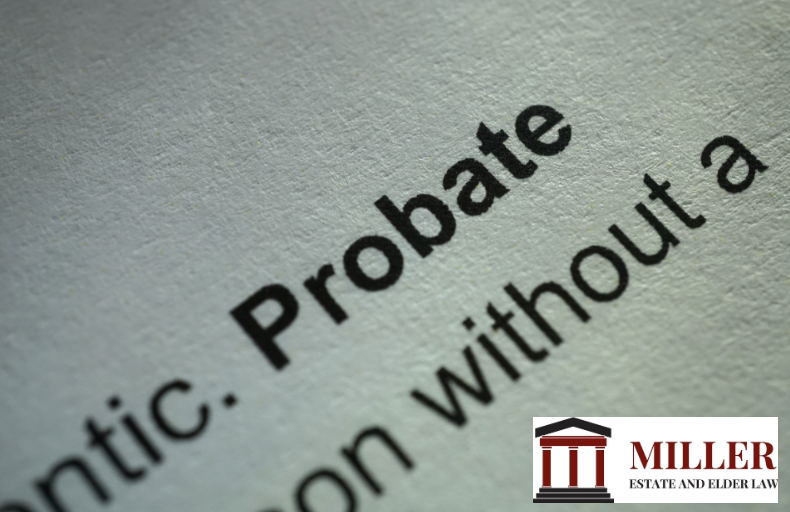
by Bill Miller | Jan 25, 2021 | Blog, Elder Law, Estate Planning, Probate
If there were ever a year to buckle up and learn a little bit about estate planning, this is it. After all, while 2020 is behind us and hope is on the horizon the Covid-19 pandemic has made it amply clear that the future is uncertain and preparedness is the best defense. Estate planning plays a part in this. Not only does having a plan protect your hard-earned assets from avoidable taxes, aggressive creditors, and potential reckless spending by heirs, it also ensures your loved ones are spared the cost and burden of probate court should the unthinkable happen.
What Is Probate?
Probate is the state-run, court-sponsored process of authenticating a person’s last will and testament. It is the place that evaluates a passed loved one’s assets, pays their final bills and taxes, and distributes what is left over to beneficiaries. As simple as this all sounds, the reality is a minefield of contentious family decisions, legal costs, and changing legislation. Each state determines their own probate laws and they are subject to regular update and so attempting to administer probate yourself or with the help of an automated service is a gamble of both resources and time.
An experienced probate attorney can help you avoid all of this but the financial cost is often greater than organizing an estate plan and the emotional burden is untold.
Avoiding Probate
Hassle and associated fees are not the only reason to avoid probate; for some, they are not even the main reason. While awaiting probate, your heirs will not see a penny and may not have access to your accounts. They will need to pull from their own pockets to cover not only court costs, but property insurance, taxes and even storage fees until probate is officially opened. In present times, when so many peoples’ finances are already stretched to the limit, this can be devastating.
Another reason to skirt probate is that records are public and available to anyone to view. You would not want your bank balances shared openly while living and there is no reason you would want otherwise once you have passed on.
In addition to expediting the process and saving on the cost of distributing your assets, an estate plan that avoids probate is also private. It keeps everything in the family, literally.
The first step to getting an estate plan off the ground is to list all you own and organize a family meeting. Once you have addressed the delicate subject of inheritances and chatted about who might serve as executor, financial power of attorney, and medical power, the next step is to reach out to a trusted and experienced estate planning lawyer.
Your attorney, guided by your goals and wishes, ensures the rest is easy. In less time than you think and at a fraction of both the financial and emotional cost of probate, you’ll have your affairs in order and you’ll move on to living your life secure in the knowledge that at least one of the future’s big uncertainties no longer looms on the horizon.
To see how we can help you contact Miller Estate and Elder Law today!. You can also simply call us at 256-472-1900. Talk to you soon!

by Bill Miller | Jan 6, 2021 | Blog, Elder Law, Estate Planning
Unless you are familiar with Tony Hsieh and his business approach, the connection between shoes and asset management might not seem obvious. Indeed, even if you do know a thing or two about the late former CEO of Zappos, you still might fail to see the connection. After all, what does your life’s work have to do with your footwear? Unless you have blown your savings into collector kicks, the truth is not much; however, if you are talking about the common ground between running a successful shoe enterprise and a successful estate and elder law firm, then the similarities are plenty.
Tony, who passed away tragically in late November founded the internationally-recognized online shoe retailer Zappos and in so doing left a legacy that can be counted not only in dollar signs, but in the much richer currency of human happiness. This is because Zappos is an outlier in the world of online retail. The company runs on ten core values which all, in some form or other, exist to ensure customers, as well as employees, vendors, shareholders and the community all leave any interaction with Zappos feeling happy. These values are the following:
- Deliver WOW Through Customer Service
- Embrace and Drive Change
- Create Fun and A Little Weirdness
- Be Adventurous, Creative, and Open-Minded
- Pursue Growth and Learning
- Build Open and Honest Relationships with Communication
- Build a Positive Team and Family Spirit
- Do More with Less
- Be Passionate and Determined
- Be Humble
Notably, nothing about shoes appears and there is not a single mention of profits. This is because, as the title of Tony’s book Delivering Happiness: A Path to Profits, Passion, and Purpose would indicate, happiness is profit, as well as so much more.
The lesson to be learned from Zappos applies at least as much to estate and elder law as to online retail. After all, an estate plan is only successful if one, it provides peace of mind to the person for whom it is prepared and two, eases the burden upon their family when they pass. These outcomes, peace and ease, are cousins of happiness and the cornerstone of a successful practice. When they are lost from sight, so too is an estate and elder law firm’s raison d’être.
Here at Miller Estate and Elder Law we take this to heart. Your happiness, as well as that of everyone involved in our operation, is fundamental. This is because when you leave our office, you do not leave with anything—not even a new pair of shoes—if you do not leave happy. Sure, we might secure your assets for future generations, ensure you have access to the care you need in old age, and help you in making the most of your life’s work (among many other services), but none of that is worth a great deal if you do not feel good doing it. Money and security mean little without well-being, after all.
In sharing this reflection, our goal has been to offer some insight into our practice. If you are reading this and happen to be a current or former client, hopefully all that has been said rings true. Whether this be the case or not, it would mean a lot if you could drop us a review on Google and AVVO. Reviews, both positive and negative, help us do a better job of helping you but more than that, they help other folks out there find services that are invested not only in raking in profits, but in nurturing happiness and building connection. Thank you!
If you would like to know how we can help with your estate plan, contact us today. You can also call 256-472-1900 to set up a consultation.

by Bill Miller | May 4, 2020 | Blog, Elder Law, Uncategorized
Did you know May is National Elder Law Month? This month holds special importance to us as we support all Alabama seniors, their loved ones, and their caregivers. We know that you and your family may need extra help not only this month, but throughout the year. One of our goals as a firm is to ensure that you are protected in all circumstances. We want to ensure that you have the help, guidance, and resources you need now, and throughout the year.
Unfortunately, many Alabama seniors and their loved ones have only taken the step to complete their estate planning. While estate planning is essential, it is not elder law planning. Estate planning contemplates both lifetime and end-of-life decisions. For example, you can make a document such as a durable power of attorney that can ensure that you have a decision maker with legal authority in place in the event you cannot make decisions for yourself. Or, by contrast, you could make a last will and testament that directs who should inherit from you at the time of your passing.
The same tools, however, do not necessarily protect you by addressing elder law concerns. Elder law, sometimes referred to as elder care law, is a relatively new area of law. It primarily addresses the issues that can arise as a result of the aging process. For example, should you need long-term care:
- How will you find the right care for you?
- How do you know what to look for?
- Can the services you need be provided in your home?
- Further, if you were to need to move to a long-term care facility, would you be able to pay for it?
Many of us do not have unlimited resources. This means, without elder law planning, we would be at risk of losing all of our assets and impoverishing our loved ones if we had to pay for the high cost of nursing home care without assistance.
We know these may be considerations that you have never thought of before. This National Elder Law Month, let us take a moment and share information on three critical areas addressed through elder law planning that you need to know for yourself and your family.
1. Alabama Medicaid. Medicaid is a combination of state and federal dollars that you may be able to access to help you pay for the cost of long-term care. Know that Medicaid is not Medicare. While all seniors are eligible for Medicare this is not the same thing for Medicaid. Medicare is a health care program that can help most seniors defray the cost of acute medical care. Medicaid, by contrast, is an eligibility program that can help pay for custodial care in a nursing home. You must qualify through a health, income, and asset test to be able to access these valuable resources, which we can discuss with you in a consultation at our firm.
2. Family Caregivers. Family caregivers are the unsung heroes in America. Family caregivers are often under-appreciated and unpaid for the services that they provide. Further, without the guidance of an elder law attorney, you may be paying your family caregiver for his or her much-needed help, but jeopardizing your ability to access the benefits of the Medicaid program. This is one of the things that we can discuss in a meeting at our office. The most important thing is for you to know that you are not alone. You can click this link to learn more about how to best manage this new responsibility in your life and how to help yourself and the aging senior you are caring for.
3. Veterans Affairs Pension Benefits. For wartime veterans and their dependents, there are additional benefits available through the department of Veterans Affairs. One such benefit is the pension program. This is a monthly, tax-free benefit that is available to qualifying Alabama seniors. Similar to Medicaid, there is a health, income, and asset test as well.
We know this article may raise more questions than it answers. We encourage you not to wait to learn more about the benefits and resources available to Alabama seniors now, or at any point in the future. Do not wait to schedule a meeting with attorney Bill Miller to discuss your questions and learn how to protect yourself and your family.

by Bill Miller | Nov 20, 2018 | Elder Law, Medicaid Planning
Life throws curveballs sometimes, and we have to be ready. In her 40s, Joanie thought Medicaid planning was far ahead of her. She put off talking to her attorney about Medicaid planning. Unfortunately, she suffered permanent traumatic injuries as a result of a car accident. Her family frantically searched for ways to pay for Joanie’s 24/7 nursing care. As they started the Medicaid application process, they wished Joanie would have done some Medicaid planning.
Why Start Medicaid Planning?
Long-term care is expensive. There are basically three ways to pay:
- Self-pay, which can deplete a person’s life savings;
- Long-term care insurance, which may charge high premiums or be impossible to get; or
- Government benefit programs, like Medicaid.
Applying for Medicaid is not easy. For one thing, Medicaid uses a 60-month look back period. This means they review an applicant’s financial records for the 60 months prior to his or her application date. Certain transactions may cause Medicaid benefits to be delayed or even denied. However, Medicaid planning can take care of this before Medicaid is even needed.
For example, an individual might change their property titles or transfer all their property to a trust or just outright give real property or high-end assets to heirs. This type of activity must be done before the 60 month look back period, though.
How to Start Medicaid Planning.
Consult with an attorney who understands the Medicaid process. Specifically, you will want to talk to someone who knows
It may be possible for you to re-title your property. This can be tricky and lead to unintended – an unwanted! – consequences if done incorrectly.
An attorney who understands Medicaid planning may be able to give you more information about long-term care insurance. It’s not for everyone but can be an excellent way to pay for long-term care instead of digging into savings and retirement accounts.
Finally, there are trusts that may allow you to safeguard at least some of your hard-earned assets for your heirs.
Don’t Wait.
The attorneys at Miller Estate and Elder Law know how to help you with Medicaid planning. For a free consultation, contact us at 256-251-2137 or use our convenient Contact Form. We also offer free workshops and guides with more information about topics that matter to you. Although we’re located in Anniston, we also help clients in the Birmingham, Gadsden, Hoover, Talladega, Vestavia Hills, and surrounding areas.

by Bill Miller | Oct 12, 2018 | Caregivers, Elder Law
Louise provided in-home services for an elderly couple, Leonard and Amelia. Five days a week, she helped the couple bathe and dress, cooked, did some light housekeeping, and helped manage their prescriptions. Louise felt that most of the couple’s medical needs were being met. As a caregiver, she did have some legal concerns about her patients.
The General Durable Power of Attorney
Caregivers may closely watch their clients’ medical conditions. They may see their patients gradually deteriorate to the point of incapacity. Before this happens, a caregiver may suggest the patient sign a general durable power of attorney.
This document gives the patient the opportunity to plan ahead for his or her financial affairs. The principal – the person signing the power of attorney – can name a trusted person to make financial decisions and pay bills. As long as the power of attorney is ‘durable’ the authority granted continues even if the principal becomes incapacitated.
Patient Needs a Health Care Power of Attorney
A caregiver understands the important of having an advanced directive or health care power of attorney. Like a general durable power of attorney, the person signing the document names a trusted person to make decisions for them. In this document, however, the agent is given authority over medical decisions.
Patient Needs to Apply for Government Assistance
Sometimes patients need long-term care. The caregiver may realize that the patient would benefit from government programs like Medicaid and VA benefits. There’s even a Medicaid program designed for family caregivers.
Navigating government benefit programs can be difficult and frustrating. It helps to have someone on your side.
Patient Needs to Hire an Attorney
Which brings us to getting someone who can help with the other three concerns: a lawyer. A caregiver may see a need for a patient to consult with an attorney. One thing to be careful of, however, is to avoid any appearance of undue influence over the patient.
The attorneys at Miller Estate and Elder Law efficiently assist their clients with their estate planning, Medicaid applications, and probate. For a free consultation, contact us at 256-251-2137 or use our convenient Contact Form. Although we’re located in Anniston, we also help clients in the Birmingham, Gadsden, Hoover, Talladega, Vestavia Hills, and surrounding areas.

by Bill Miller | Oct 10, 2018 | Elder Law, Medicaid
Jeanie lived several hours away from her parents, Norah and James. As they entered their 80s, Norah and James started needing a little more assistance, so they could stay in their home as long as possible. Unfortunately, Jeanie was unable to be with them as much as she would have liked. She started asking her friends whether her parents could get Medicaid to help with daily activities.
What is Medicaid?
It’s a needs-based government program. However, while most Medicaid funding comes from the federal government, individual state governments manage their own Medicaid agencies.
What are ‘daily activities?’
Officially, Medicaid calls these “Activities of Daily Living” or ADLs, which include:
Eating, bathing, dressing, caring for personal hygiene, toileting, transferring from bed to chair and vice versa, ambulation, maintaining continence, and medication management.
Health care providers may assess an individual’s ability to perform daily activities before deciding what type of care they need. For example, if Jeanie’s mom, Norah, is having trouble moving around the house, taking a bath, and remembering to eat, her medical providers may suggest she get someone to care for her.
Some people may also need assistance with Independent Activities of Daily Living (IADLs). These activities include meal preparation, using the telephone, doing laundry, making beds, dusting and vacuuming.
What services are offered?
When an individual needs assistance with ADLs or IADLs, Medicaid may pay for in-home and out-of-home assistance, medical supplies that help the individual perform ADLs. The services offered may depend primarily on the level of assistance needed with ADLs, but could include:
- Hiring skilled nurses to provide in-home care.
- Attending an adult day health services center.
- Transferring to an assisted living facility.
- Moving into a nursing home.
Medicaid also offers home and community based waivers. The Elderly and Disabled (E&D) Waiver Program assists people who are elderly and/or disabled. The person in need may get services like house cleaning, personal care, adult day health, adult companion, and home delivered meals.
Can Medicaid Help with Daily Activities?
Jeanie learned that Medicaid did indeed have programs that could provide her parents with the care they needed.
The attorneys at Miller Estate and Elder Law. help their clients get the benefits they deserve. For a free consultation, contact us at 256-251-2137 or use our convenient Contact Form. Although we’re located in Anniston, we also help clients in the Birmingham, Gadsden, Hoover, Talladega, Vestavia Hills, and surrounding areas.





